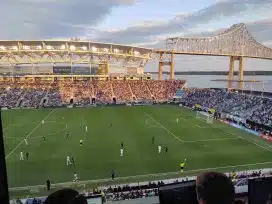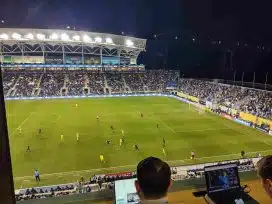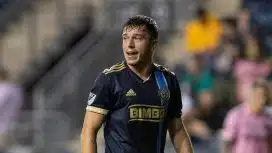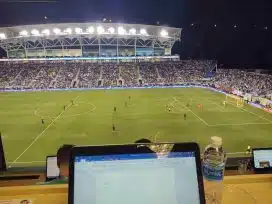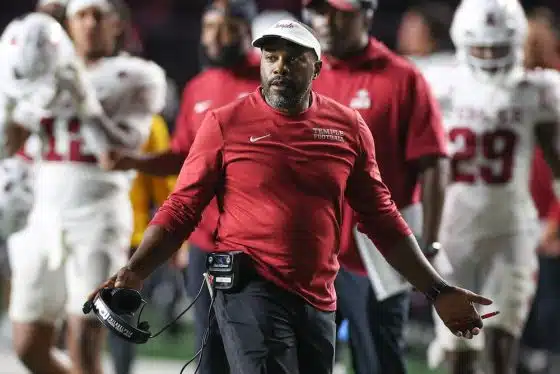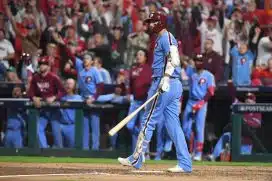Flyers
Series in Review: Flyers-Lightning 2004
By Kevin Durso, Sports Talk Philly editor
Reaching the Eastern Conference Final in 2004 required a heart-stopping overtime period in Game 6 in Toronto that ended with Jeremy Roenick going top shelf on Ed Belfour to get the Flyers to the next round. At that time, the Flyers were becoming a team that appeared to be on the path to the Stanley Cup. A team that had a strong foundation of young stars, role players, solid defense and goaltending was in the way and making the quest for the first Stanley Cup in their franchise history.
This series was a seven-game showdown that truly went back and forth. The Tampa Bay Lightning would strike in one game, the Flyers would respond. When the Flyers had their backs against the wall in Game 6, a late goal flipped the series back around and helped it reach the distance. In the end, just two goals separated the teams in the seven-game series and it was a one-goal margin in Game 7 that decided the series.
Today, we continue the Series in Review series with a closer look at the 2004 Eastern Conference Final between the Flyers and Lightning.
Game 1: Lightning 3, Flyers 1
For more than 20 minutes of Game 1, neither team could get on the board. As a Lightning power play ended, Dave Andreychuk got the puck down low and lifted a shot over Robert Esche to put Tampa Bay on the board at 2:03 of the second. The Flyers were able to counter with a goal at 6:48 with Michal Handzus scoring on a rebound.
Late in the second the Lightning would take the lead for good. A chance by Frederik Modin was blocked and his second chance got through and Brad Richards was in the right place in front of the net to backhand home the rebound to make it 2-1 with 6:26 remaining in the period.
Just over seven minutes into the third, a dump-in by Chris Dingman hit the endboards and bounced to Andre Roy. Roy’s shot was stopped by Esche, but left a huge rebound for Dingman to clean up, making it 3-1 with 12:56 remaining. The Flyers could not solve Nikolai Khabibulin the rest of the way and Tampa Bay struck first in the series.
Game 2: Flyers 6, Lightning 2
After struggling to score in Game 1, the Flyers broke out in Game 2. Just 1:53 into the first period, John LeClair scored from the wing to open the scoring. On a power-play midway through the period, Mark Recchi added a goal to make it 2-0 at 8:50. Less than three minutes later, Sami Kapanen scored shorthanded to make it 3-0 at 11:17.
The Flyers kept the scoring barrage on in the second. Vladimir Malakhov scored at 6:02 to make it 4-0 and Handzus added another goal with 12 seconds left in the period to make it 5-0.
Early in the third at 3:34, Mattias Timander capped the scoring for the Flyers to make it 6-0. Tampa Bay got two goals in the final 10 minutes from Ruslan Fedotenko and Martin St. Louis on the power play, but the damage was done and the Flyers evened the series with ease.
Game 3: Lightning 4, Flyers 1
It was clear that Khabibulin wasn’t on his game in Game 2, but he got that back in Game 3, making 24 saves. His strong start allowed the Lightning to get the early edge. Cory Stillman scored on a long-range shot at 12:56 and Fedotenko added a power-play goal that leaked through Esche at 15:20 to open up a 2-0 Tampa Bay lead.
The score held into the third, and just 36 seconds into the game Keith Primeau scored on a rebound to cut the lead to one. Just 43 seconds later, Vincent Lecavalier restored the two-goal lead with a breakaway goal. The Flyers had a power play with a chance to close the gap, but failed to score and at 8:20 of the period, Richards finished off a perfect passing play to put the game away and make it 4-1.
Game 4: Flyers 3, Lightning 2
Again in Game 4, there was no early goal to set the tone, but a four-minute penalty to Simon Gagne for high-sticking gave the Lightning extended power-play time. They took full advantage with Modin scoring on a rebound at 12:43.
The Flyers closed the opening period by grabbing two quick goals to take the lead. First, LeClair fired a rifle from the high slot to tie the game with 3:05 left in the period. Just 1:25 later, Recchi scored on a deflection to put the Flyers in front.
Midway through the second, the Lightning had a chance to tie the game on the power play, but the Flyers grabbed more momentum instead. Andreychuk fell trying to play the puck at the blue line and that started a shorthanded two-on-one for the Flyers. Primeau took it the entire way and fired a shot to the top shelf on Khabibulin to make it 3-1.
The Flyers held the 3-1 lead into the final minute of the third when Lecavalier fired a long-range rocket that cut the lead to one. The Flyers held on for the 3-2 win to even the series at two.
Game 5: Lightning 4, Flyers 2
Game 5 was all about the Tampa power play. It was a penalty-filled first period and Tampa struck at 10:30 with Fedotenko getting the Lightning on the board. Tampa got another power play late in the first and struck again early in the second with Richards firing a one-timer from the left circle to make it 2-0. Another power-play goal for Richards at 7:12 of the second made it 3-0 and had Tampa rolling.
The Flyers had a quick response though, as Handzus scored on a one-timer just 1:44 later and Patrick Sharp added a goal just 38 seconds after that to make it a 3-2 game again.
The Flyers could not tie the game on two late power plays in the second and Khabibulin held them off the board for the rest of the third too. Tim Taylor added an empty-net goal with 15 seconds left to seal the result and put Tampa back up in the series, 3-2.
Game 6: Flyers 5, Lightning 4 (F/OT)
In a win or go home Game 6, things didn’t start well for the Flyers as Tampa’s young star struck again. Lecavalier scored just 1:28 into the game to put the Lightning in front early.
The Flyers answered back with goals by Gagne and Primeau in the period to take a 2-1 lead, but Lecavalier tied things back up at two just 45 seconds into the second period. From there, the teams traded goals. Kapanen scored to give the Flyers the lead again at 12:42, but Fedotenko answered at 15:15 to tie the game at three. The only power play of the game for Tampa came late in the second and Fedotenko scored again to give the Lightning the lead.
For the entire third period, the 4-3 score held, down to the final two minutes of play as time was running out. That’s when a perfect bounce and reaction from the captain prolonged the Flyers season. A point shot by Timander was stopped by the pad of Khabibulin and the rebound hit off the skate of Primeau at the side of the net, hopped the pad of Khabibulin and came out the other side. Primeau was able to locate it, dance around the net and tuck it home, tying the game with 1:51 remaining.
That forced overtime, and just like in the third period, time was running out on the period when the Flyers got their chance and struck. Primeau furthered the puck behind the net to Roenick, who tried to stuff it at the side of the net. Khabibulin stopped the attempt, but the puck shot out to Gagne at the other side and he put it home to win the game and force Game 7.
Game 7: Lightning 2, Flyers 1
As had been the case in previous games, giving Tampa Bay power play chances was proving deadly for the Flyers. When Primeau went to the box for high-sticking with 3:27 left in the first period and the Lightning went to the power play for the first time, they wasted no time getting on the board. It was another deflection for Fedotenko that put the Lightning ahead.
Just shy of five minutes into the second, the Lightning extended the lead with Modin picking up a loose puck in front and putting it home to make it 2-0. But the Flyers didn’t go quietly, getting a goal at 10:16 from Kim Johnsson to cut the lead back to one.
For most of the game, the Lightning stuck to their traditional style and shut down the Flyers, limiting them to just 23 shots in the game. As the final minutes ticked away, the Flyers were just not generating the opportunities they needed to get the equalizer. Ultimately, time ran out on the Flyers and the Lightning advanced with a 2-1 win.
It was an interesting series for the Flyers, as there was no group of players that truly dominated the scoring. Primeau was far and away the Flyers top player, posting four goals and eight points in the series when no other player topped five.
Meanwhile, on the other side, Richards had eight points for the Lightning, including four goals. Lecavalier also scored four goals and former Flyer Fedotenko had six in the series.
This was the start of a Tampa Bay team that could have certainly won a lot more over the years if not for the lockout that canceled the 2004-05 season. They had a foundation of young forwards — Richards and Lecavalier were both 23 and St. Louis was 28 but just starting to emerge as a star in the league — while having a solid group of depth forwards like Fedotenko, Modin, Stillman and Andreychuk.
While no defensemen scored goals in the series, they had good stability with a defensive group led by Darryl Sydor, Dan Boyle and Pavel Kubina. Khabibulin did not produce All-World numbers in the series, but his 17 goals allowed and .905 save percentage were more than enough with the scoring depth the team had.
Tampa Bay simply had more players in their prime than the Flyers did. The Flyers had nine players on the roster age 32 or older. Tampa Bay had just five players age 30 or older on the roster.
It marked another devastating end to a playoff run that had come so far only to fall short, especially with as much excitement as there was from the series leading up to this. Highlights from the entire series can be found in the video below.
Tomorrow, our series will continue as we look back at the series that brought the Flyers to the Eastern Conference Final, the 2004 Easter Conference semi-final matchup between the Flyers and Toronto Maple Leafs.
















